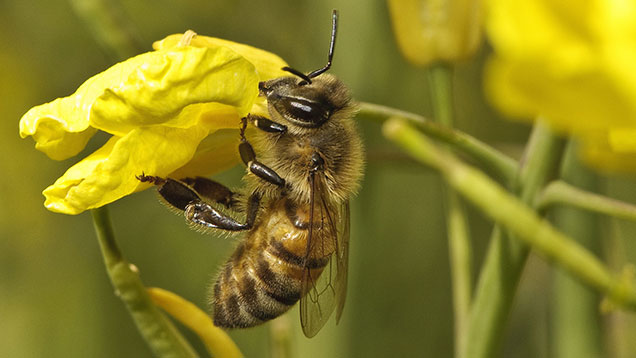Study reignites debate over farming benefits of neonics
 © FLPA/Rex Shutterstock
© FLPA/Rex Shutterstock The debate over the farming benefits of neonicotinoid pesticides has been reignited following the publication of a government-backed study.
Scientists from the Food and Environment Research Agency (Fera) studied the effects of coating oilseed rape seeds with imidacloprid in nine regions of England and Wales between 2000 and 2010.
They found that farmers who used neonicotinoids reduced the number of foliar insecticide sprays used to control pests on oilseed rape.
See also: What farmers need to know about neonics emergency approval
But the use of the pesticide was associated with a 10% decrease in 126,200 bee colonies, the study found.
Published in the Nature journal Scientific Reports, the study also found that using Bayer CropScience’s imidacloprid on OSR had “no consistent effect” on crop yields.
Dr Giles Budge, Fera’s head of crop science and lead author of the study, said: “Our data indicate that farmers who used neonicotinoid seed coatings often had positive economic returns driven by an increase in yield, but this was not always the case.
“We now need to understand why neonicotinoid use does not always result in increased profitability for farmers to help target appropriate use to those situations where farmers see the most benefit.”
The study revealed that more honeybee colonies were lost as the usage of imidacloprid increased.
But colony losses were also linked to adverse weather and showed regional patterns, with beekeepers in Wales suffering consistently high losses.
In particular, farmers recorded heavy yield losses in 2008, blamed on the effect of heavy rain leaching chemicals.
Dr Budge said: “Our analyses suggest that honeybee colonies are being lost due to a range of pressures including imidacloprid usage, regional factors, adverse weather and, in our other work, pests and diseases.
“The drivers behind these losses are complex but it is important that the science community continue to present a balanced argument to help farmers, beekeepers and the public understand the costs and benefits of agricultural practices. Further evidence, particularly from large scale field studies, is vital.”
Farm leaders and scientists have clashed over the findings of the study.
The NFU said the study provided strong evidence that the use of foliar sprays dropped by a quarter when using neonicotinoid seed treatments, which was better for the environment.
NFU Bee health specialist Chris Hartfield said: “From this study we can see clearly that neonicotinoid use results in oilseed rape yield increases, which are vital in increasing farm productivity and profitability.”
However, Paul de Zylva, senior nature campaigner at Friends of the Earth, said scientific evidence was “overwhelming” that neonicotinoid pesticides “harm honeybees and wild bees alike”.
The European Commission banned the use of imidacloprid and two other neonicotinoid pesticides on flowering crops including rape and barley after scientists linked their use to bee colony losses.
However, the UK government, which maintains the ban is “unjustified”, last month approved the emergency use of neonicotinoids in four English counties this autumn, where farmers have seen their rape crops hammered by cabbage stem flea beetle.
A Defra spokesman said: “This paper provides evidence that neonicotinoid seed treatments can reduce the need for more pesticide use on crops. Large-scale field studies are needed to fully understand their effects on the environment. The government makes decisions on pesticides based on the best available scientific evidence.
“The EU Commission has now begun a review of the science relating to neonicotinoids and bees, and the UK will contribute fully to this review.”

